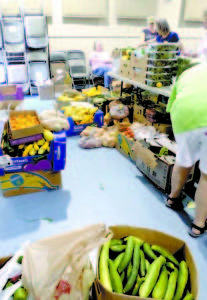Food insecurity: Pantries see spike in winter

BOXES AND BAGS — of fresh produce are staged for distribution at CrossWalk Community Outreach food pantry on Monday. (De Busk Photo)
By Dawn De Busk
Staff Writer
NAPLES — Not everyone who needs extra assistance with food is able to get to a local food pantry.
One pantry volunteer knows someone in his neighborhood who receives hospice care after a head injury left him unable to work. While hospice helps a few times a week, the man does not always get a nice, healthy meal.
Randy Steber is a Naples resident and a volunteer for CrossWalk Community Outreach, the nonprofit organization that provides the public with a food pantry and free meal twice a month. CrossWalk serves residents in five communities: Sebago, Naples, Casco, Bridgton and Harrison.
Every other Monday, Steber brings a box of food to his neighbor.
“My fiancée takes food from the house and cooks for him. Sometimes, she tries to cook a meal from what he has in his kitchen. But, it isn’t much,†Steber said.
“One day I brought him a maple-filled muffin. You could see his eyes light up when he bit into it. He said, ‘Randy, thank you.’ I thought, ‘What did I do but pick up a box because he couldn’t get out,’ †Steber said.
While this situation is not the commonplace scenario, a growing percentage of families in the region rely on food pantries to make ends meet.
While transportation expenses factor into the increasing cost of food at the grocery stores, wintertime heating fuel costs tend to take the biggest toll on household budget.
According to CrossWalk Vice President Nancy Vose, there was an increase in food pantry numbers around mid-winter.
“Since January we were in the 70s for the number of families who use the food pantry,†she said.
But, by the first part of February, 100 area families stood in line at the food pantry. Essentially those families represented 260 people who took advantage of the services.
The number of households jumped even higher in April. There were two food pantry offerings that month. On April 14, 105 families (or 286 people) benefited from the pantry; and on April 28, 119 families (or 336 folks) accessed the food pantry, according to Moore.
“There were obvious spikes in the winter into the spring,†she said.
By June, the individual households that used the pantry — that number had settled back down to 83, Moore said.
Volunteer Steber said during the summer months, more children come through with their parents because of school vacation.
He said food insecurity is a problem that effects all ages.
“There is an older generation and a younger generation,†he said.
It doesn’t make him feel sad that members of society need help from food banks. Those people walk away with boxes and bags of food — including fresh produce — that they would have otherwise not had in their cupboards and in their refrigerators.
Mary Fernandes said she wonders how many people in the region are in need, but don’t show up to the food pantry.
“In Maine, some people will go hungry or freeze†during the winter “because they are too proud,†she said.
At the Casco Alliance Church’s food pantry, which serves only Casco residents, the average is 25 households, or 75 to 80 people, according to Judy Theberge, who coordinates that program.
“In the fall and winter, we go close to 30 households, about 90 to 100 people. That is from about October through January and February,†she said.
“That is when people are having to pay for fuel. We tend to see more families and elderly, too,†Theberge said.
“We do emergency baskets. That can be a couple per month (because) people are running short on groceries. Maybe, their food stamps didn’t come in,†she said.
Theberge works with a team of about eight to 10 volunteers who help with boxes and take them out to the vehicles.
Casco Alliance Church holds it food pantry in the evening because most of her volunteers have day jobs.
She said usually when she tells her volunteers that they can bring some food home, they tell her no because someone else might need it more.
“There are a lot of needy people in this area. I don’t meet them all. Some are too proud to come, which is sad,†she said.
“Some people won’t do that. Some have pride, and they don’t want to use the food bank. They feel like people are going to put them down or not think as much of them if they do,†she said.

